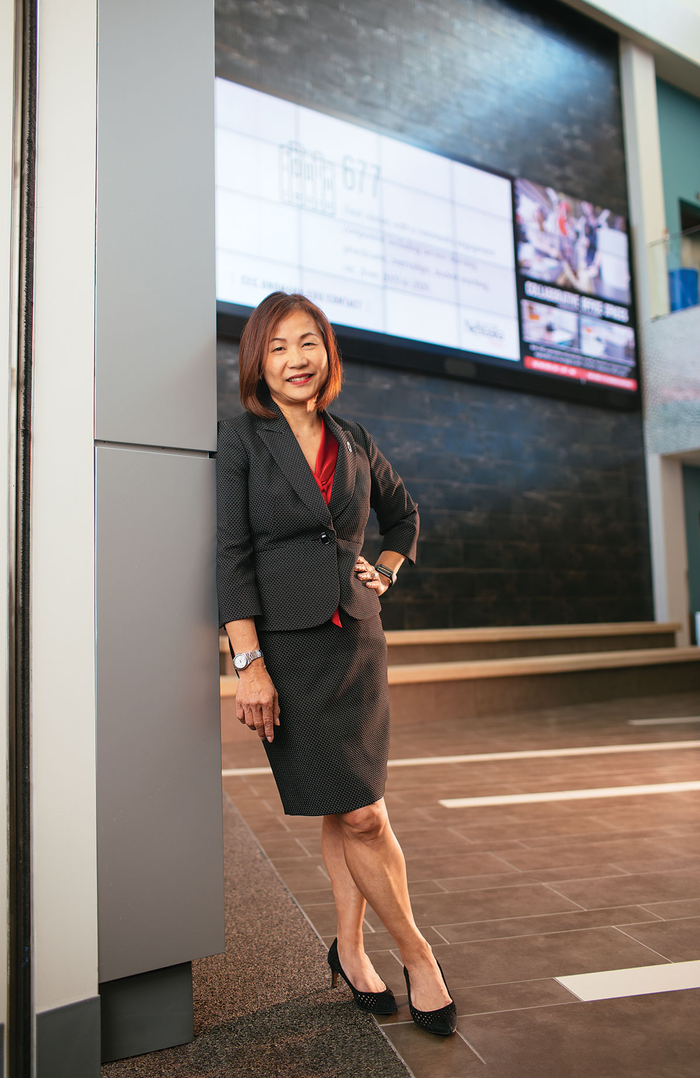Ask Chancellor Dr. Joanne Li about her plans to lead the University of Nebraska at Omaha into the future and she’s a tour de force, rattling off ambitious goals and the strategies needed to reach them. Ask her how the University must change to meet the demands of the modern-day college student and she’s equally at the ready, detailing opportunities and challenges with ease.
Ask her what it feels like to make history and you’re met with a brief, awkward silence. It’s not that she’s unaware that she’s the first Asian American executive and the first woman of color to serve as chancellor at UNO, she just doesn’t see why it’s such a big deal.
Or at least, she didn’t before a chance encounter on campus following her confirmation as chancellor last spring.
“Honestly, I don’t feel any different. On a given day, work has to be done and I just feel very fortunate to be able to serve alongside a lot of great people in this community,” she said. “But I remember one encounter I had when I first came here last June. I met this young lady, and if I remember correctly, she was of Vietnamese descent. She was so overwhelmed with joy, she just choked up in tears to see an Asian woman in this role.”
Li continued, “I think through her eyes I understood. And I now have a profound appreciation of how, even though I don’t think of myself as a big deal making history, I understand the significance to many constituencies. If it just happened that I represent that, I am proud to be that.”
Whatever significance Li’s gender or ethnicity may carry, it’s merely icing on a multi-layered professional cake, having served with distinction in leadership roles over 15 years in higher education. She started as an associate professor in the Sellinger School of Business at Loyola University of Maryland, then chaired the Department of Finance at Towson University.
From there, she served as dean and professor of finance at Wright State University in Ohio before taking over as dean of the College of Business at Florida International University, where she boosted graduation rates and vastly improved faculty diversity. None of which is lost on University of Nebraska System President Ted Carter.
“We went out on a national search and had an incredible response,” he said. “A lot of people saw the value of a metropolitan campus. We had well over 60 qualified candidates and it was very difficult to narrow that search down.
“When we came out with one priority candidate, I was personally involved in the interviews and had not met Dr. Li prior to the interview process. I was blown away. She’s got just the right energy, the right talent, the right life story. I immediately saw her as a natural leader in the academic space.”
Given all that, it doesn’t take much to see why UNO was eager to hire Li. But with her lack of connection to the area, it begs the question: what stood out to Li about UNO?
“What really caught my attention was, being a finance professor, I know Omaha is a very special place,” she said. “It has Fortune 500 companies, it has Fortune 1000 companies, it has Berkshire Hathaway. It’s Warren Buffett’s town, it’s Walter Scott’s town. That’s number one. I’m a finance person.
“But what really caught my eye about UNO is, I really do believe higher education is and will be defined by urbanization. An urban university is a fountain of knowledge, and in close proximity to a bigger population we’re able to create a fountain of new discoveries and innovations. Going forward as an urban university, we can create pedagogy and learning modalities that can influence other parts of the state or out-of-state or even internationally.”

Photo by Bill Sitzmann
Li comes to the role at a time when the higher education landscape is shifting underfoot. Changing student demands and wider online learning options are completely redefining the so-called “traditional college student.” Students are also expecting more for their tuition dollar.
“More university students are not following the traditional route,” she said. “They have family obligations. They’re just taking classes part time, they cannot take full time, but they still expect to optimize the experience not in five years, not in six years, but maybe four and a half years.
“So, learning through higher ed institutions is changing. Our job is no longer, as an urban university, just to prepare people pursuing a degree, but to get into the marketplace. It’s what I call stackable knowledge, and the stackable degree is one space where UNO is going to go forward.”
Li’s vision for such learning is revolutionary in its hyperfocus and short classroom time. Curriculums that used to span 16 weeks have been condensed into three or four by targeting very specific elements to meet very specific demands.
“It may not be the whole curriculum within the school; maybe just two elements or maybe an element very specific to an employer or very specific for the candidate to re-skill and up-skill,” Li said. “Going forward, UNO cannot just think we’re going to produce a degree candidate. We should think about how we can retain the current workforce that’s already in Omaha, who intend to stay in Nebraska. What can we do to continue to provide a sustainable career path for these people?
“Our goal for the future is to explore credentialing, micro-credentialing, certification, and areas we think can be stackable knowledge for candidates. That is really very attractive.”
Above all, Li relates to the potential an urban campus such as UNO has for promoting a diverse student body. At the same time, she recognizes the range of disparities that come with it. A native of Hong Kong, Li is a first-generation college student who well remembers arriving in the United States and having to borrow $600 from a friend to pay for her first semester of community college.
Whatever formal education her subsequent coursework taught her—from graduating summa cum laude with a finance degree in 1992 to earning her doctorate in 1997 (both from Florida State University)—it’s these real-life lessons that stick with her the most.
“As a first-generation college student, as someone who relied all through my academic career on scholarships, I recognize the issues of underserved communities,” she said. “That’s one of the things that I relate to very much with UNO, because we do serve a high percentage of students who require a lot of help to finish their journey.
“When a university arrives at a certain threshold, it has a responsibility to scale the reach of higher ed, meaning reaching into areas, communities, and populations that in the past may not have had easy access, whether because of affordability or geography or modality. I really think we will be able to reach into those communities by using technology or by thinking differently about pedagogy. I do believe UNO has the potential to do that for the community.”
She pauses a moment.
“I feel like someone gave that to me and I’d like to pass it forward to some other family. I see the impact UNO can have if we do things right.”
Visit unomaha.edu/about-uno/chancellor
This article originally appeared in the October 2022 issue of Omaha Magazine. To receive the magazine, click here to subscribe.











